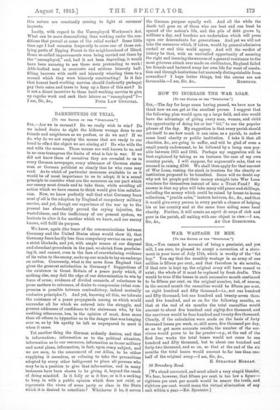PUBLIC ASSISTANCE.
[To TIER EDITOR OF TOE "ETECTILTOR.°] Sin,—In the article on the "Problem of Public Assistance' in the Spectator of July 81st you refer to the abuse of the maternity benefit under the Insurance Act which obtains when the husband of a woman confined in a Poor-law instate- tion is allowed to spend this money while the mother and child are cared for by the ratepayers. But you make no mention of a far greater abuse which occurs in the case of unmarried mothers. In these cases the maternity benefit is in many cases handed over to the parents of the insured person, the Act thus encouraging these people to enjoy the immoral earnings of their daughters.
As for old-age pensions, in London they merely represent indiscriminate and inadequate outdoor relief, which is con- demned by all who have studied poor-law questions, and against which the Guardians of England and Wales were especially warned by a Local Government Board circular at the very time that the Old Age Pensions Bill was being discussed in Parlia- ment. I have no hesitation in stating that in the great majority of cases which come under ray notice the old-age pensions do more immediate harm than good to the pensioners (although I am free to admit that my experience may be a little one- sided). Time and again we find that these pensioners, who ought for their own good to be admitted to some institutions will not consent to be reritoved from their squalid surround- ings, as they prefer to live in filth and misery on their wretched five shillings a week rather than be cared for in a clean and orderly institution ; in this they are sometimes encouraged ley their relatives, who contrive to keep these poor old people out less than the five shillings and thus make a little profit out 14 them. Before the old-age pensione were instituted the aged poor of this type were forced into the infirmaries by the refusal of the authorities to grant them. out-door relief; this power is now gone, and the result is that the poor old creatures remain outside until they are in many instances reduced to a condi- tion Which ie a disgrace to any civilized community. Cases of
this nature are constantly coming to light at coroners' inquests.
Lastly, with regard to the Unemployed Workmen's Act. What can be more demoralizing than working under the con- ditions that prevail at some of the relief works ? Some little time ago I had occasion frequently to cross one of those out- lying parts of Epping Forest in the neighbourhood of Ilford. Some so-called improvements were being carried out there by the "unemployed," and, had it not been degrading, it would have boon amusing to see these men pretending to work! Able-bodied men in overcoats and mittens leisurely half- filling barrows with earth and leisurely wheeling them to a mound which they were leisurely constructing! Is it fair that honest hard-working navvies should (indirectly perhaps) pay their rates and taxes to keep up a farce of this sort? Is it not a direct incentive to these hard-working navvies to give up regular work and seek their leisure as " unemployed" P-



































 Previous page
Previous page